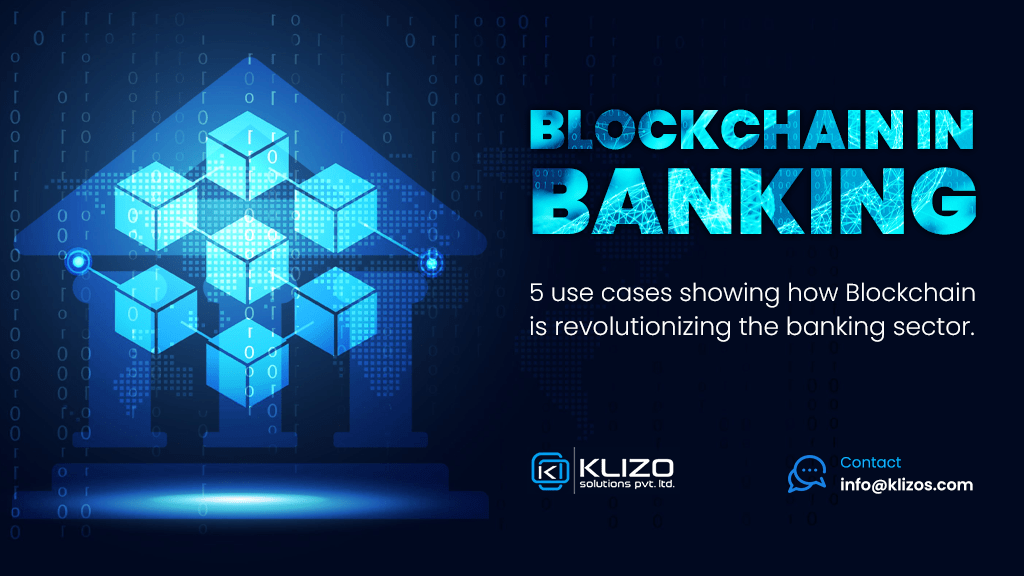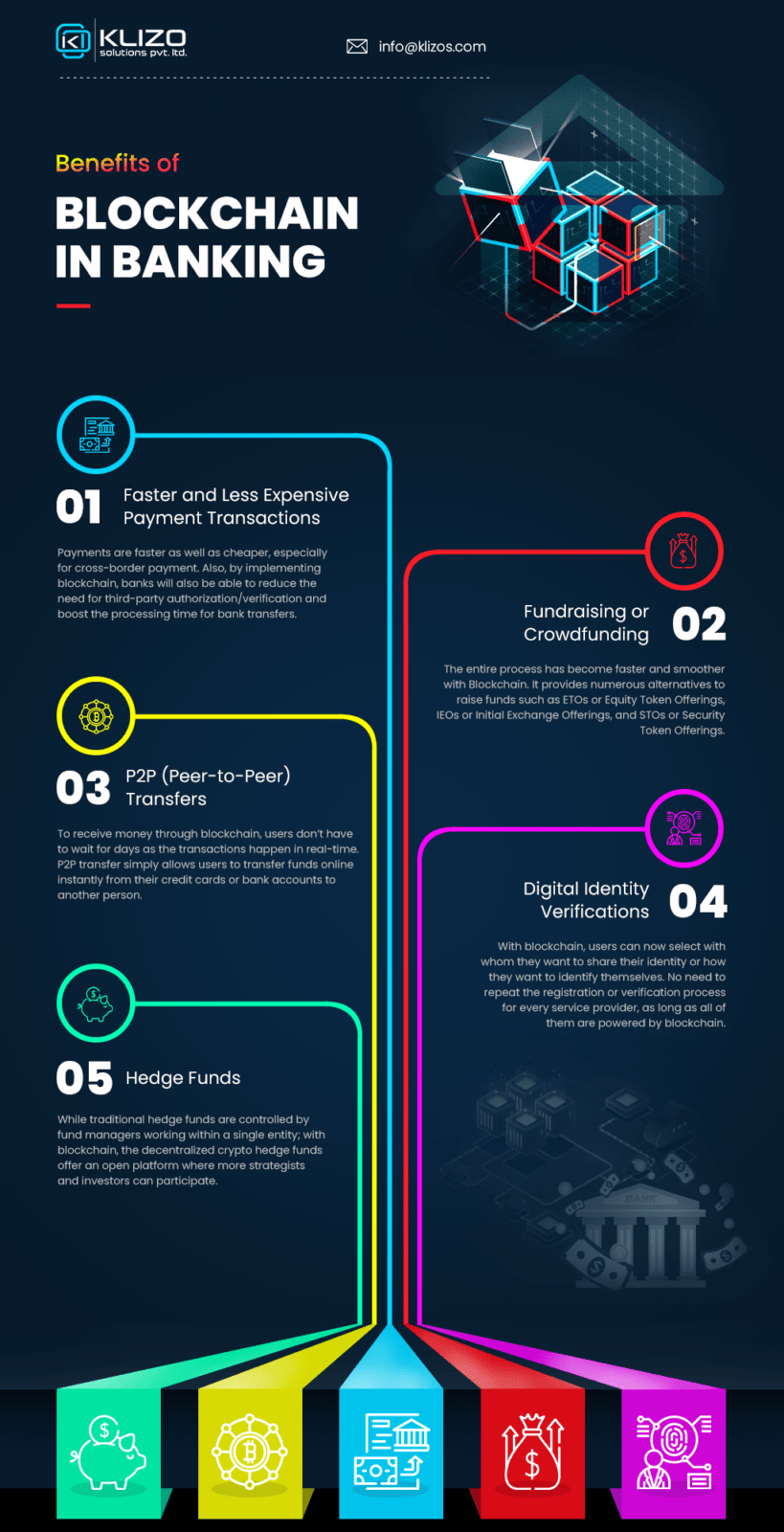


Due to the meaningful and secure collaboration that blockchain offers, this trending futuristic tech is no longer limited to the ether transaction and bitcoin. Yes, blockchain has paved its way into many industries, blockchain in banking being one of them.
The banking industry is prone to cyber-attacks, so, requires high security. And that’s where blockchain technology comes in, eliminating the possible security threats to the financial domains can be possible.
According to the World Economic Forum, blockchain is the financial sector’s heartbeat.
Are you new to the concept of using blockchain in the banking industry? Well, we have brought together blockchain use cases and a glance into the advantages offered by this cutting-edge technology to the banking sector. Read on.

The most popular domain using blockchain technology is the banking sector. Curious to know how the banking sector or the financial services industry is and will be attempting to implement blockchain in the coming years?
Then here are some use cases of blockchain technology in banking accompanied by some real-life examples that might help you to get a grasp on how this technology is revolutionizing the finance industry.
Both commercial and central banks across the world are now opting for blockchain to process their payments as well as issue digital currencies of their own. Why?
Because with blockchain in banking sector, payments are faster as well as cheaper, especially for cross-border payment. When banks can charge lower costs for sending payments and provide high security, naturally they can opt for launching new services and introducing new products to the market while competing with the new fintech startups.
Plus, by implementing blockchain, banks will also be able to reduce the need for third-party authorization/verification and boost the processing time for bank transfers.
Example:
One of the largest banks in Australia, Westpac, partnered with a blockchain solution enterprise, Ripple in 2016 to adapt to a cross-border low-cost blockchain-based payment system.
In the same year, the US Federal Reserve was also working with IBM to execute a digital payment system based on blockchain technology.
Call it crowdfunding or fundraising, the process is considered to be rather complicated today. Here the money is raised through online venture capital or by asking a small amount of money to each one of a large group.
But with blockchain in the field now, the entire process has become faster and smoother. Blockchain provides numerous alternatives to raise funds such as ETOs or Equity Token Offerings, IEOs or Initial Exchange Offerings, and STOs or Security Token Offerings.
Example:
Security Token Offerings are presently the most popular legally protected tokenized IPO. Scerri & Concise Ltd is one of the leading examples of STOs while Neufund is a brilliant example of an ETO trading platform.
(P.S. Though ICOs or Initial Coin Offerings were once popular; now they are considered to be unreliable and deceptive.)
Blockchain doesn’t come with any limitations. It is there basically everywhere all over the world. Even to receive money through blockchain, users don’t have to wait for days as the transactions happen in real-time.
P2P transfer simply allows users to transfer funds online instantly from their credit cards or bank accounts to another person.
Example:
The Circle app is an example where peer-to-peer transfers are allowed in fiat as well as for cryptocurrencies. Here, users are allowed to deposit money to the app from their debit or credit card.
The Berlin-based cryptocurrency bank Bitwala is another example of the use of blockchain in banking where messenger-like functionalities have been combined with P2P money transfer service.
Without identity verification, it’s impossible to perform any online financial transaction. But usually, this online identity verification process consists of numerous lengthy steps that often annoy the users, such as:
But due to the application of blockchain in banking, this whole verification process gets accelerated benefiting both the service provider and the users. Thanks to blockchain tech that securely reusing identity verification for other services is possible.
With blockchain, users can now select with whom they want to share their identity or how they want to identify themselves.
Yes, even with blockchain in identity verification, users still need to register their identity on the blockchain. But the importance of blockchain in banking is that users no longer have to repeat the registration or verification process for every service provider, as long as all of them are powered by blockchain.
Example:
Tradle, Cambridge Blockchain are popular examples of fintech startups where blockchain is implemented to accelerate the customer identity verification process.
Hedge funds are nothing but financial partnerships where pooled funds are used and numerous strategies are employed to ensure the investors some active returns while minimizing the risks.
In simpler words, in hedge funds, an investment partnership is formed where a fund manager along with a group of investors as limited partners are involved. But wait, in hedge funds the investors aren’t any ordinary investor but traders.
While traditional hedge funds are controlled by fund managers working within a single entity; with blockchain that now decentralized crypto hedge funds offer an open platform, where more strategists and investors can participate.
Example:
Crypto Asset Fund, Alphabit Fund, CoinShares are some of the best examples of crypto hedge funds (decentralized) or blockchain case study in banking.
Are you looking for a reliable blockchain team who can help you explore the potentials this innovative technology has to offer?
After all, security is of utmost importance in any financial domain.
So, if you belong to a financial institution and need assistance with blockchain applications, then look no further. Get in touch with us at Klizo Solutions to explore more about the implementations of blockchain technology in banking domain. We are already working with this innovative tech and helping our clients to get smart business solutions. Get connected with us and let’s build something great together.
Previous article
Joey Ricard
Klizo Solutions was founded by Joseph Ricard, a serial entrepreneur from America who has spent over ten years working in India, developing innovative tech solutions, building good teams, and admirable processes. And today, he has a team of over 50 super-talented people with him and various high-level technologies developed in multiple frameworks to his credit.

Subscribe to our newsletter to get the latest tech updates.